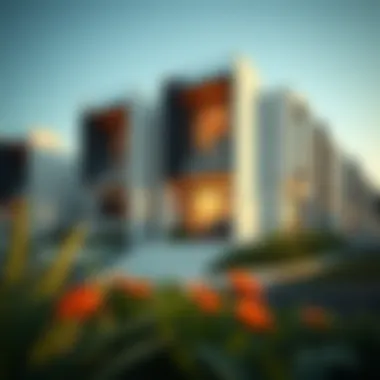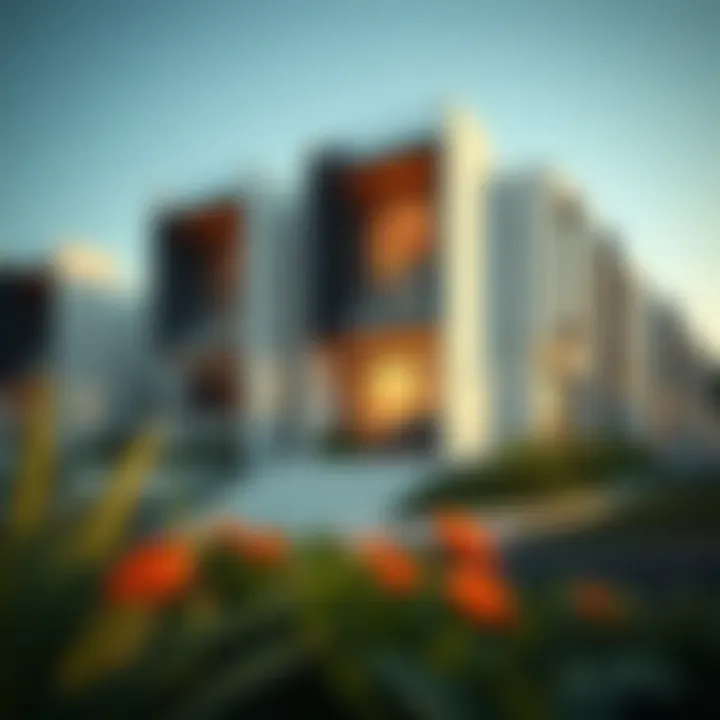Current Off-Plan Property Developments in Dubai


Intro
The allure of Dubai as a global city continues to captivate investors, expatriates, and real estate enthusiasts alike. Amid this vibrant landscape, off-plan projects have emerged as a pivotal segment, enticing those seeking to capitalize on the city’s dynamic growth. With Dubai's skyline constantly evolving, the opportunities for savvy investors are plentiful, but so are the complexities in navigating the market.
This article seeks to illuminate the intricacies of the off-plan project scene in Dubai, exploring recent developments, emerging trends, and the resulting implications for potential buyers. Whether you’re an investor looking for the next big hit or simply intrigued by the real estate dynamics in this bustling city, this guide is designed to equip you with valuable insights and information.
Throughout the ensuing sections, we’ll dive into crucial aspects such as current market trends, pricing structures, strategic investment options, and discerning the merits of buying versus renting. Each subsection will unravel the current climate, pointing towards key projects and notable developers in this continuously shifting arena.
Let’s navigate this journey together, ensuring you have every tool at your disposal to make informed decisions in the exhilarating yet complex off-plan market of Dubai.
Prologue to Off-Plan Projects
In the ever-evolving landscape of the Dubai real estate market, off-plan projects stand as an alluring opportunity for investors and buyers alike. These ventures allow individuals to purchase properties that are yet to be constructed or are in the early stages of development. This approach not only opens doors to potentially lucrative investments, but it also enables buyers to customize their future homes in a way that fits their personal needs. Understanding the nuances of off-plan projects is crucial, particularly in a vibrant market like Dubai, where real estate can shift gears at the drop of a hat.
Definition of Off-Plan Projects
Off-plan projects refer to properties that buyers can purchase before they are completed. This process involves putting down a deposit to secure ownership typically based on architectural plans and renderings rather than an actual physical structure. Buyers often get a good price and more choices in terms of layouts, materials, and fixtures because they commit to a project in its infancy. This method is common in bustling markets, as it not only helps capital flow into the development but also allows buyers to take part early in valuable projects.
Importance in the Dubai Real Estate Market
The significance of off-plan projects in Dubai's economy cannot be overstated. They serve as a catalyst for economic growth, ushering in new developments that accommodate the city’s ever-expanding population. Moreover, off-plan properties can yield high returns, attracting foreign investment and fostering competition among builders. Buyers often face less competition for these properties when they are initially offered. A notable point is that with the right timing, an off-plan investment can appreciate significantly even before the project is completed. As opportunities arise and the skyline transforms, buyers gain a front-row seat to the burgeoning landscape of modern Dubai.
"Investing in off-plan projects is akin to planting a seed today for a towering tree tomorrow."
Understanding these aspects helps demystify the appeal of off-plan properties and how they shape the future of real estate in Dubai. As prospective investors traverse these waters, knowledge of off-plan dynamics can provide a compass ensuring informed decision-making.
Current Market Trends
The landscape of off-plan projects in Dubai is ever-evolving, shaped by various market dynamics that influence investor sentiment and purchasing behaviors. Staying informed about current market trends is not just advantageous—it is crucial for anyone looking to make sound investment decisions in this bustling city. Among the key trends to be aware of are the investment growth patterns and the demographic influences that characterize this vibrant real estate sector.
Investment Growth Patterns
Investment in off-plan properties in Dubai has been on a steady rise, reflecting both local and international confidence in the market. As buyers increasingly look for opportunities that promise solid returns, several noteworthy patterns have arisen:
- Increasing Foreign Investment: More expatriates are turning their eyes towards Dubai's off-plan developments. With favorable regulations and no property taxes for expatriates, the Emirate continues to attract foreign buyers.
- Shift Toward Sustainable Projects: Investors are notably leaning towards developments that prioritize sustainability, which aligns with Dubai's vision to become a leading global city in eco-friendliness. Projects that boast green building certifications or smart technologies are seeing increased interest.
- Focus on Prime Locations: Demand for off-plan properties in prime areas like Dubai Marina or Downtown Dubai remains high, but emerging neighborhoods are also gaining traction. Areas such as Dubai Creek Harbour are seeing rapid growth due to planned amenities and improved infrastructure.
This shift in investment focus is not merely a trend; it reflects a broader, long-term strategy that aims to create a balanced portfolio that withstands market fluctuations.
Demographic Influences
The demographics of Dubai's population play a significant role in shaping the off-plan market. Understanding these influences can give potential investors insights into consumer preferences and demand:
- Expanding Expat Community: With expatriates making up a substantial portion of the population, demand for various types of properties, from luxury villas to affordable apartments, is increasing. The influx of skilled professionals looking for housing options directly impacts what developers prioritize in their projects.
- Young Population: A significant percentage of Dubai's demographic is composed of millennials and young professionals. This group tends to favor modern, stylish living spaces and prefers locations with easy access to amenities like cafes, shops, and entertainment venues.
- Shift in Lifestyle Preferences: The recent pandemic has led to changes in lifestyle preferences. Spaces designed for remote work, community amenities, and outdoor areas are becoming more desirable. Developers are responding to this demand by integrating suitable designs in their off-plan projects.
By understanding the demographics influencing investment trends, stakeholders can position themselves strategically within the market.
In summary, keeping an eye on these current market trends provides valuable insights for investors, buyers, and developers alike. Gone are the days when decisions were made on a whim. Today's landscape stresses planning and adaptability to thrive in Dubai's competitive real estate arena.
Prominent Off-Plan Projects in Development
When diving into the real estate landscape of Dubai, the focus shifts increasingly towards off-plan projects. These developments not only shape the skyline but also represent critical investment opportunities. Understanding what makes them stand out is essential for investors, buyers, and agents alike. By exploring these prominent off-plan projects, you’ll unearth potential benefits and consider crucial aspects that can impact investment decisions.
Iconic Developments to Watch
Dubai is no stranger to ambitious projects, and its current off-plan developments continue this trend. Take for instance the Dubai Creek Tower, a titan in the making that aims to redefine the concept of vertical space. Projected to soar higher than the Burj Khalifa, the tower is a part of a larger community aimed at enhancing connectivity and livability. For investors, the uniqueness of this project speaks volumes about its future appreciation value.
Another noteworthy mention is the Dubai Hills Estate. This development captures the essence of suburban living combined with urban convenience. It features a mix of villas, townhouses, and apartments nestled around a golf course. Here, investors can expect not only dwellings but also a lifestyle enriched with green spaces and recreational facilities, making it attractive to families and expatriates.
Moreover, there’s the Emaar Beachfront, an area that blends luxury living with picturesque beaches. Situated between the iconic Palm Jumeirah and Dubai Marina, the proximity to the water elevates this development's allure. Units in Emaar Beachfront are designed with modern aesthetics, promising lifestyle advantages that can easily entice buyers.
"In Dubai, off-plan projects are not just buildings; they are gateways to future potential and growth."
As these iconic developments take shape, potential investors are advised to conduct thorough research. Understanding the developers’ track records and the specific project intricacies can lead to informed decision-making.
Emerging Neighborhoods of Note
The landscape of off-plan projects is not just restricted to well-established areas. Emerging neighborhoods are sprouting, delivering exciting possibilities. One such neighborhood is MBR City, which is rapidly becoming the go-to destination for families settling in Dubai. The area offers a variety of options, from affordable apartments to luxury villas. What attracts buyers is the community-focused design that prioritizes accessibility and shared amenities.
On another front, Dubai South is making waves by positioning itself as the future hub for logistics and aviation, thanks to the proximity of the Al Maktoum International Airport. Here, off-plan properties promise to become hot commodities as the area grows into a bustling economic center. Investors looking to enter a market before it peaks may find opportunities in the numerous projects blossoming in this zone.
Lastly, the Downtown Jebel Ali area is gaining attention for its potential to house various residential and commercial units. With a focus on eco-friendly construction and sustainability, this emerging neighborhood is taking a progressive approach to urban living. For those keeping an eye on market trends, this area reflects a shift toward greener solutions in development projects.
In summary, recognizing these iconic developments and emerging neighborhoods can significantly enhance your real estate portfolio in Dubai. Being informed about the landscape's dynamics allows you to seize the leads in a market overflowing with potential.
Key Developers in the Off-Plan Sector
In the context of Dubai's booming real estate landscape, understanding the key developers in the off-plan sector is crucial. These developers play a pivotal role in shaping the market, influencing the types of projects available, and determining the quality of developments that potential investors may encounter. Their reputation, financial stability, and project execution record can make or break an investment decision, thus highlighting the need for investors to remain informed about who is leading the charge in this exciting sector.
Established Brands and Their Offerings
Several established brands dominate Dubai's off-plan scene. These giants have carved out a niche through their commitment to quality, timely project completions, and customer service. One such example is Emaar Properties, renowned for its iconic projects like the Burj Khalifa and the Dubai Mall. Their offerings often include luxurious residences complemented by excellent amenities, making them a preferred choice among high-end buyers.


Another prominent player is Damac Properties, which specializes in upscale residential, commercial, and leisure properties. They have introduced innovative concepts such as branded residences in collaboration with global luxury brands, appealing to affluent clientele.
Nshama is also notable. With their Town Square development, they focus on creating community-oriented projects, which cater to mid-market buyers. Their approach balances quality and affordability, and this has made them quite popular among first-time investors.
Investors should assess the following when considering established brands:
- Track Record: Investigating previous projects to gauge timely completion and quality.
- Financial Stability: Understanding the developer's financial health can avert potential pitfalls.
- Reputation: Engaging with online reviews and feedback from other homeowners can give insight into customer satisfaction.
Above all, buying from well-established brands often offers a layer of reassurance, given their experience in navigating the market.
Up-and-Coming Developers to Consider
While established developers are essential, new players are emerging and shaking things up. These up-and-coming developers may offer innovative designs and competitive pricing, appealing to a different segment of the market. Aldar Properties is one such developer that has shown tremendous growth and is now recognized for its quality mixed-use developments across the UAE.
Binghatti Developers is another notable name rapidly gaining traction. They're known for their contemporary designs that resonate with younger buyers. Their projects often employ sustainable building practices, catering to environmentally conscious investors. This focus on sustainability can be more than just a marketing strategy; it can enhance future resale value and buyer demand.
As new entrants populate the market, investors should pay attention to:
- Innovation in Design: Many up-and-coming developers prioritize modern aesthetics and eco-friendly solutions.
- Affordability: These developers often offer competitive pricing schemes, which can be enticing for first-time buyers.
- Niche Offerings: Many newer developers focus on specific demographics, whether it's families, singles, or retirees.
Investing with emerging developers could lead to opportunities in unexplored neighborhoods, enriching the overall investment portfolio.
"Keeping an eye on developing players can yield unexpected benefits in Dubai's dynamic market, where change is the only constant."
In summary, both established and emerging developers will shape Dubai's off-plan real estate landscape. A thorough understanding of their offerings can equip potential investors with the insights needed to make more informed decisions as they navigate this exciting market.
Investment Considerations
Investing in off-plan projects in Dubai can be a double-edged sword. On one hand, it offers the potential for considerable gains, yet it also comes with a fair share of risks that one needs to navigate carefully. Understanding investment considerations is crucial for anyone eyeing the bustling Dubai real estate market.
This section will explore two key elements that every investor should take into account: analyzing financial risks and expected returns on investment. By factoring these aspects into your decision-making process, you can minimize uncertainties and make informed choices that align with your financial goals.
Analyzing Financial Risks
When considering off-plan investments, one must take a good hard look at the risks involved. It's not just about the allure of buying property before it’s completed; there are financial nuances that can catch even the seasoned investor off guard.
Here are several risks to consider:
- Market Fluctuations: The real estate market can be as unpredictable as a cat on a hot tin roof. Prices can rise and fall due to economic conditions, and if the market dips, you might end up with a property worth less than what you paid.
- Developer Reliability: Not all developers are created equal. The reputation and past performance of the developer are paramount. A developer with a shaky track record may not deliver, leading to potential losses.
- Regulatory Changes: The Dubai real estate landscape can shift due to new regulations or policies. Staying informed about these changes is essential, as they can affect your investment's value.
"Investing in off-plan properties requires due diligence. Understanding the market and the players involved can save you from costly mistakes."
- Construction Delays: Delays in the building process can push your projected return further down the road or possibly lead to increased costs. Investing in areas that have a history of construction delays could spell trouble.
Expected Returns on Investment
Looking at the bright side, off-plan investments can indeed yield impressive returns if navigated properly. When you assess expected returns, consider several factors that may influence profitability in the long run.
Key considerations include:
- Location: The age-old adage of "location, location, location" holds true. Properties in emerging neighborhoods tend to see quicker appreciation compared to those in less sought-after areas.
- Market Trends: Keeping an eye on market trends can help you predict future performance. Are property values on an upward trajectory? Is there infrastructure development in the pipeline that could raise property values?
- Payment Plans: Flexible payment options might be more attractive. Many developers offer stage payment plans where you pay in installments as construction progresses. This can enhance cash flow management, increasing your overall investment return.
Additionally, we cannot overlook that early buyers often benefit from lower prices when the project is newly announced. As the construction progresses and the project's visibility increases, prices generally rise, thus providing the opportunity for substantial gains upon completion.
In summing up, understanding the financial risks and expected returns is an essential part of the investment puzzle in Dubai’s off-plan real estate market. By properly analyzing these factors, investors significantly increase their chances of making sound decisions that yield fruitful returns.
Legal Framework and Regulations
The legal framework surrounding off-plan projects in Dubai is a vital aspect for any investor, buyer, or agent venturing into this dynamic market. Understanding the regulations not only safeguards investments but also ensures that all parties involved are compliant with local laws. In a city like Dubai, where property ownership can vary significantly from other countries, having a solid grasp of these laws is indispensable.
When diving into off-plan projects, a few key regulations come into play. First, there is the Dubai Land Department (DLD), which governs all real estate transactions to guarantee legitimacy and transparency. This underscores the importance of registering any property, including off-plan purchases, with the DLD. Failure to do so can lead to significant legal troubles down the line.
Additionally, the Real Estate Regulatory Agency (RERA) plays an essential role in regulating the real estate sector in Dubai. They establish specific guidelines that developers must follow when selling off-plan properties. For buyers, particularly expatriates unfamiliar with local nuances, these regulations provide protections, such as clarity on refund policies if projects face delays or cancellations.
Another critical element is the Escrow Account Law, which mandates developers to keep buyers’ funds in a separate escrow account. This requirement is critical as it ensures that the money is safeguarded until the project reaches a certain level of completion, reducing the risk for buyers. In essence, the legal safeguards in place aim to balance the scales between investor interests and developer responsibilities.
"Understanding property laws in Dubai is not just a precaution; it's a strategic advantage for successful investments."
Understanding Property Laws in Dubai
Navigating the property laws specific to Dubai can feel like traversing a maze. The UAE Federal Law No. 5 of 1985 is the cornerstone of property rights, emphasizing freehold ownership, leasing rights, and more. Under this law, both expatriates and UAE nationals can own property in designated areas. Knowing which zones allow foreign ownership is crucial for off-plan buyers, as it directly impacts potential investment outcomes.
Moreover, the concept of leasehold versus freehold properties is pivotal. While freehold ownership grants complete rights to the property indefinitely, leasehold can limit duration. This distinction is significant when considering long-term investment plans.
It's also essential to mention the importance of property registration, as any ownership transfers must be documented to be legally binding. Without proper registration, investors risk not having their purchases recognized, which could lead to complications in the future.
Documentation Required for Off-Plan Purchases
When it comes to purchasing off-plan properties, there are certain documents that anyone interested in investing should have handy. First and foremost, the buyer must secure a valid passport copy along with a residency visa if applicable. These documents are crucial for establishing identity and citizenship for any legal transaction.
In addition to the personal documents, buyers should also expect to provide proof of address, usually in the form of a utility bill or bank statement. Moreover, a No Objection Certificate (NOC) from the developer may be required, especially if the purchase pertains to an already established project. This certificate confirms that there are no outstanding dues or encumbrances associated with the property.
Lastly, buyers will often need to complete an off-plan purchase agreement. This legally binding document outlines all terms and conditions related to the property, including payment schedules and potential completion dates. Not having this could result in significant legal repercussions, which underlines the necessity of being thorough in due diligence.


In summary, the legal landscape regarding off-plan projects in Dubai is multi-faceted and requires careful navigation. By understanding the laws and required documents, buyers can position themselves for success in this promising market.
Financing Off-Plan Purchases
Financing off-plan purchases in Dubai is a significant aspect for investors and buyers alike. The allure of off-plan properties lies not just in their potential for appreciation but also in the financing opportunities that come with them. Understanding how to navigate financing options can empower buyers and lead to well-informed decisions. With numerous possibilities on offer, it's essential to highlight some key elements and benefits tied to financing these types of investments.
In essence, financing presents a way for buyers to leverage their investments. This means they can acquire properties of higher value while using smaller initial capital. For expatriates, this becomes particularly crucial as many international buyers might not have immediate liquidity or vast cash reserves. The freedom to spread payments over an extended term allows more flexible budgeting and financial planning.
Furthermore, lenders in Dubai have developed specialized products aimed directly at off-plan purchases, often offering favorable terms. These create unique opportunities to invest in the booming Dubai real estate market while managing risk effectively.
Financing Options Available
When diving into financing options for off-plan properties, buyers will encounter various avenues. These include but are not limited to:
- Bank Mortgages: Many banks in the UAE provide tailored home loan products specifically for off-plan purchases, allowing buyers to pay in installments as the property progresses through various construction phases.
- Developer Payment Plans: Some developers may offer their own financing solutions. These plans usually include staggered payment schedules aligned with construction milestones.
- Personal Loans: For those who prefer not to commit to a mortgage, personal loans can serve as an alternative, albeit typically at higher interest rates.
- Islamic Financing Options: This complies with Sharia law, offering a different approach to property financing. It involves equity participation rather than traditional interest-based loans, appealing to many buyers in the region.
Understanding these options is crucial in determining the right fit for one’s financial situation. Buyers should carefully assess their long-term financial goals, including considerations about the total cost of borrowing and the timeline for property completion.
Navigating Mortgage Processes
Navigating the mortgage process for off-plan properties is not without its challenges. For many, it may feel like walking a labyrinth. However, breaking it down into manageable steps can make it less daunting. Here are some breadcrumbs to follow:
- Pre-Approval: Start by obtaining a mortgage pre-approval from a lender. This gives a clearer picture of budget limits and the level of financing available.
- Documentation Necessities: Prepare the needed paperwork. This often includes identity documents, proof of income, and details on the property itself. Having these ready is half the battle.
- Understanding Terms: Make sure to understand interest rates, payment terms, and any fees associated with the mortgage. Don’t hesitate to ask questions seeking clarity.
- Finalizing the Mortgage: Once you select a lender, the final mortgage application takes place. Here, the lender's underwriting process will assess your creditworthiness and the viability of the property.
- Disbursement of Funds: Upon approval, funds will be disbursed according to project milestones, meaning it’s essential to keep track of construction progress.
"Navigating the mortgage terrain in Dubai requires diligence. Understanding both the local market and construction timelines can save a buyer from frustration."
Market Performance Predictions
The predictions about the market performance of off-plan projects represent a pivotal aspect of investing in Dubai's dynamic real estate scene. Understanding these predictions helps investors navigate risks, anticipate shifts, and make well-informed decisions. The insight gained from market trends, buyer behavior, and economic indicators not only assists individuals in maximizing their investment potential but also shapes their strategic plans for future acquisitions.
With house prices fluctuating and the demand for real estate showing varying patterns, analyzing market forecasts is crucial. Investors need to be clued into both short-term realizations and long-term projections to effectively balance their portfolios. Here, we delve into the immediate outlook and the broader trends that are informing the sector's trajectory.
Short-Term Outlook
In the short-term, the landscape of off-plan projects appears promising yet complex. The immediate market is often influenced by factors like changes in government regulations, interest rates, and the overall economic health. A notable element is the steady demand for affordable housing in Dubai, which is projected to stimulate ongoing development, particularly in the city’s emerging neighborhoods.
"The next twelve months are expected to see more activity in sales, especially in projects that cater to younger buyers and expatriates keen on investing with lower entry costs."
Additionally, a significant number of foreign investors are maintaining their interest in Dubai, drawn by its tax-friendly environment and year-round sunshine. Many off-plan projects designed to appeal to the expatriate community are expected to see brisk sales, as they take advantage of flexible payment plans that developers are offering to entice buyers fearing inflation.
A few key indicators to monitor over the next year include:
- Population Growth
Continued influx of expatriates looking for housing will drive demand. - Consumer Confidence
As the economy stabilizes, confidence levels are likely to rise, encouraging more purchases. - Interest Rates
Fluctuating rates can impact financing options; investors will need to keep an eye on central bank policies.
Long-Term Trends
Looking further down the line, expected trends in the off-plan market suggest a more comprehensive evolution of city planning. The Dubai government aims to enhance its urban landscape, investing significantly in infrastructure improvements. This will not only up the ante for real estate in established areas but also bolster the value of off-plan projects in developing neighborhoods.
Such transformations take time, but long-term investors can expect returns as urban development plans unfold. Here’s what you might anticipate in the coming years:
- Sustainability Focus
With increasing emphasis on eco-friendly developments, off-plan projects that incorporate sustainable features are likely to attract premium buyers. - Technological Integration
The use of technology in construction and marketing will become more prevalent, reinforcing the importance of virtual tours and smart home features that are appealing to tech-savvy investors. - Diverse Offerings
A variety of developments catering to different demographics—young professionals, families, retirees—will emerge, segmenting the market more efficiently.
Investors should thus keep an ear close to the ground regarding shifts in buyer preferences, environmental regulations, and innovations in construction technologies. Collectively, these long-term trends will illuminate a path toward continued growth and profitability in Dubai's off-plan market.
Challenges Facing Off-Plan Investors
Investing in off-plan projects can feel like a game of chess. While there are plenty of opportunities available in Dubai's ambitious real estate landscape, prospective investors also encounter a number of hurdles that require careful consideration. Understanding these challenges isn't just beneficial; it's essential for making sound investment decisions. Here, we break down what investors can expect as they navigate this unique and often unpredictable market.
Market Volatility
Market volatility remains a prominent concern for off-plan investors. The real estate sector is often swayed by global economic trends, geopolitical events, and fluctuations in local demand. For instance, a sudden shift in oil prices or changes in foreign investment regulations can impact property values significantly. Investors must stay informed about market signals and maintain a flexible approach, ready to adapt if the winds change.
A few factors contributing to this volatility include:
- Economic Conditions: If the economy takes a downturn, it could lead to decreased demand for new properties.
- Supply and Demand: An oversupply of off-plan units can lead to diminished interest and subsequent price drops.
- External Influences: Events like the pandemic have shown how quickly markets can fluctuate, impacting buyer sentiment far beyond local borders.
A well-informed investor recognizes the signs of volatility and prepares for them, adapting strategies to navigate through unpredictable waters.
Project Delays and Cancellations
Another bump along the road for off-plan investors is the dreaded issue of project delays and cancellations. It's not uncommon for developers to face unforeseen hurdles, such as regulatory approvals, construction challenges, or financial difficulties, which can stall or even halt progress on a project. This uncertainty can lead to significant frustration and financial setbacks for investors who may have already committed funds based on promised timelines.
Here are some aspects that can lead to delays:
- Regulatory Hurdles: Compliance with local laws and regulations can slow down the approval process.
- Construction Challenges: Issues like labor shortages, supply chain disruptions, or unforeseen site conditions may arise.
- Developer Reliability: Investing in lesser-known or financially unstable developers increases the risk of project delays.
Given these potential delays and frustrations, it's critical for investors to do thorough due diligence on developers and their track records. Knowledge is power, especially in an ever-evolving market like Dubai's real estate sector. Staying ahead of these challenges can mean the difference between securing a solid investment or finding oneself in a precarious situation.
The Role of Technology in Off-Plan Sales
In today’s rapidly shifting real estate market, technology has become an indispensable ally for buyers and investors interested in off-plan projects in Dubai. It has changed the way buyers interact with properties before they are built. Understanding how technology plays a role not only highlights its importance but also reveals the nuanced advantages it brings to this dynamic sector.


Virtual Tours and Digital Platforms
Traditionally, viewing a property meant visiting a site, often involving scrawling through traffic and potentially wasting valuable time. Now, virtual tours and robust digital platforms have revolutionized this process. Prospective buyers can now embark on immersive virtual experiences right from their seated position on the couch, akin to shopping online.
Virtual reality and 3D visualization tools allow buyers to walk through homes, explore different layouts, and even visualize the surrounding community. This eliminates guesswork for investors, giving them a clearer picture of what’s on offer in the off-plan arena. Developers like Emaar Properties and Damac allow buyers to visualize their future homes through high-fidelity virtual walkthroughs, making it easier for them to make decisions in a market buzzing with options.
Moreover, technology also supplies comprehensive property data online. From construction updates to neighborhood statistics, clients can access a wealth of information to make informed decisions. Digital platforms simplify the process of comparing properties and facilitate communication with developers, aiding in quick decision-making.
- Benefits of Virtual Tours:
- Convenient access to property views.
- Time efficiency in narrowing down choices.
- Enhanced understanding of the layout and space.
Impact on Buyer Decision-Making
The shift to digital means a major transition in how buyers approach their choices. The increase in information available at their fingertips has led to what can be termed as empowered decision-making. Investors can now assess multiple properties without the added pressure of high-pressure sales scenarios. They take the time they need to compare offerings, read reviews, and digest information carefully.
The presence of online forums and social media also serves as a double-edged sword. While it provides a platform for buyers to learn from each other's experiences, it also gives rise to a cacophony of opinions that could lead to confusion. Many buyers are taking their research a step further by utilizing tools like social media platforms such as Facebook. These platforms also host groups where people discuss projects, developers, and real estate strategies, building a sense of community among buyers that further aids in qualitative decision-making.
Ultimately, technology equips buyers with the tools necessary to make investment decisions that are rational and informed rather than hasty. As the landscape shifts, embracing technology has proven beneficial rather than just a convenience.
"The future of real estate buying lies in technology; the more informed you are, the better choices you make."
In a nutshell, the role of technology in off-plan sales is manifold. From enhancing property viewing to improving buyer decision-making processes, it is essential for navigating the complexities of the Dubai real estate market.
Sustainability in Off-Plan Developments
In the realm of off-plan projects, sustainability stands out as a pillar of modern development practices. Dubai, a city known for its ambitious architectural skyline, is increasingly prioritizing eco-friendly strategies in its off-plan market. Investors and developers are recognizing the importance of incorporating sustainable features into their projects, making green building practices not just a trend but a necessity. This section will explore the core components of sustainability in off-plan developments, considering various benefits and essential elements that resonate with today's conscientious investors.
Green Building Practices
Green building practices refer to constructing homes and commercial spaces that are environmentally responsible and resource-efficient throughout their lifecycle. This encompasses:
- Energy Efficiency: Implementations like solar panels or energy-efficient appliances reduce the overall energy consumption, ensuring lower utility bills and a reduced carbon footprint for residents.
- Water Conservation: Utilizing systems that recycle gray water and install low-flow plumbing fixtures can significantly lower water usage.
- Sustainable Materials: Sourcing materials that are recycled or sustainably harvested minimizes environmental impact. For instance, using bamboo, which grows rapidly and absorbs more carbon dioxide, is becoming a favorite among eco-friendly builders.
"Sustainable building practices can not only boost a project's marketability but also align with the growing demand for eco-friendly living options among buyers."
Investors looking at off-plan projects should evaluate the sustainability commitments of developers. Projects incorporating green building certifications, like LEED or BREEAM, often see a higher return on investment due to their increasing desirability.
Future-Proofing Investments
Incorporating sustainability measures not only benefits the environment but also acts as a form of future-proofing investments in off-plan projects. The idea is simple: with increasing awareness of climate change and economic pressures, properties that prioritize sustainability can lead to greater resilience against market fluctuations.
Some considerations for future-proofing include:
- Adaptability: Developers are designing buildings that can adapt to future technologies and energy sources, ensuring that they remain relevant as market demands evolve.
- Long-term Savings: With rising utility costs and potential changes in regulations regarding energy consumption, properties designed with sustainability in mind can offer significant savings over time.
- Increased Property Value: Sustainable properties often retain their value better and can appreciate at a faster rate compared to their traditional counterparts. Buyers are increasingly willing to pay a premium for homes that embody sustainable practices.
Community Impact of Off-Plan Projects
The exploration of off-plan projects in Dubai extends beyond mere statistics and investment returns. These developments shape the communities they inhabit and play a pivotal role in enhancing the quality of life for residents. Understanding community impact is essential for investors, buyers, agents, and developers alike. The ripple effects of these projects can redefine neighborhoods, influence economic footholds, and promote social well-being.
Enhancing Neighborhood Livability
Off-plan projects are designed with a vision to elevate neighborhood livability. Developers often focus on creating spaces that integrate homes with nature, amenities, and social infrastructure. This means more than just building houses; it shapes vibrant communities where families can thrive.
- Access to Green Spaces: Many new developments emphasize parks and recreational areas, offering residents a chance to unwind and stay active. Think about it—who wouldn't want to stroll in a park or let their kids play in a safe environment? Greenery not only beautifies an area but also improves air quality, promoting healthier living.
- Community Facilities: Consider the importance of schools, clinics, and shopping hubs. Off-plan projects often include these vital facilities within walking distance, making daily life more convenient. A well-planned neighborhood ensures that residents don’t have to rely on cars for essential errands, thereby fostering stronger community ties.
Being in proximity to such amenities significantly enhances the desirability of a location. Buyers and investors alike recognize that livability directly correlates with property value appreciation.
Promoting Economic Growth
Off-plan projects act as significant catalysts for economic growth within Dubai. The construction phase alone generates numerous jobs, contributing to both skilled and unskilled labor markets. This influx of employment opportunities stirs spending power, benefiting local businesses. Here’s a closer look at how these developments stimulate the economy:
- Job Creation: The diverse range of professionals involved—from architects to construction workers—builds a robust workforce. This not only supports the immediate community but also fosters economic resilience.
- Local Business Support: New residents and workers increase demand for local services. A rising population often leads to a surge in small businesses, from cafes to childcare centers, enhancing the area’s commercial vitality.
- Tourism Boost: Well-designed projects can attract tourists, especially if they align with Dubai's image as a luxury destination. Increased foot traffic means more opportunities for tourism-oriented businesses, further widening the economic impact.
Ultimately, the positive economic ripple effect from off-plan projects reverberates through various sectors, amplifying growth and sustainability.
It's crucial to recognize that community-driven off-plan developments aren't just beneficial for investors; they lay the groundwork for interconnected, thriving neighborhoods.
In summary, understanding the community impact of off-plan projects in Dubai transcends traditional investment horizons. These projects are more than concrete and bricks; they embody a vision of enhanced livability and dynamic economic growth. As the landscape of Dubai continues to evolve, keeping an eye on community benefits should remain a priority for all stakeholders involved.
Epilogue
The conclusion draws together the intricate threads woven throughout the discussion on off-plan projects in Dubai. This section serves as a crucial touchstone, emphasizing the evolving nature of the real estate landscape and how investors can strategically navigate it. By reviewing the critical insights and summarizing the essential elements captured in previous sections, this part acts as a reflective surface for the reader, encouraging deeper contemplation about their investment strategies.
Summarizing Key Insights
To distill the extensive information brought forth, several key insights emerge:
- Market Dynamics: The off-plan market remains a dynamic environment influenced by various factors such as demographic shifts, economic conditions, and technological advancements.
- Prominent Projects: Investing in off-plan properties offers unique opportunities, especially in areas seeing significant development. Projects in districts like Dubai Creek Harbour are creating attractive prospects for savvy investors.
- Monitoring Risks: While opportunities abound, there are risks. Investors must be particularly aware of market volatility and potential project delays.
- Technology's Role: The adoption of technology, including virtual tours, has transformed buyer experiences, enabling more informed purchasing decisions.
These points encapsulate the current atmosphere of Dubai's off-plan projects, allowing buyers and investors to weigh their choices with a clearer perspective.
Future Directions for Off-Plan Investments
Looking ahead, the future of off-plan investments in Dubai appears bright, with several trends demonstrating promise:
- Sustainability Focus: As green initiatives take center stage, future developments may see greater emphasis on sustainability, aligning investment choices with eco-friendly practices.
- Community-Oriented Developments: Projects that promote community living are becoming more attractive, fostering a sense of belonging and enhancing property values.
- Technological Integration: The continuous evolution of technology in real estate transactions suggests a significant shift toward online platforms and digital engagements, making investments more accessible.
- Diverse Investment Opportunities: As Dubai diversifies its economy, potential investors might find opportunities across various sectors, including commercial and mixed-use developments.
In essence, this conclusion not only summarizes but also opens the door to future considerations, underscoring the importance of staying informed about the continuously shifting tides in Dubai's real estate landscape.







